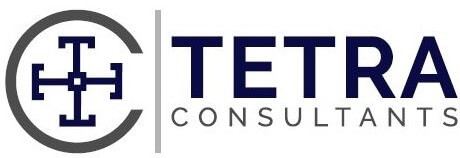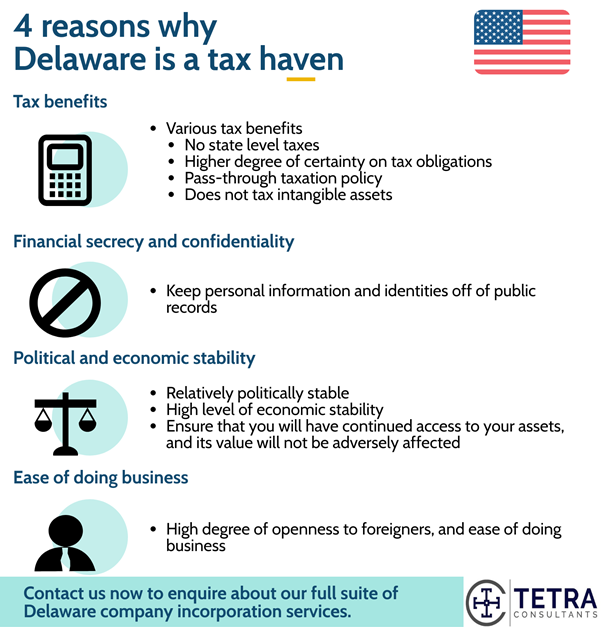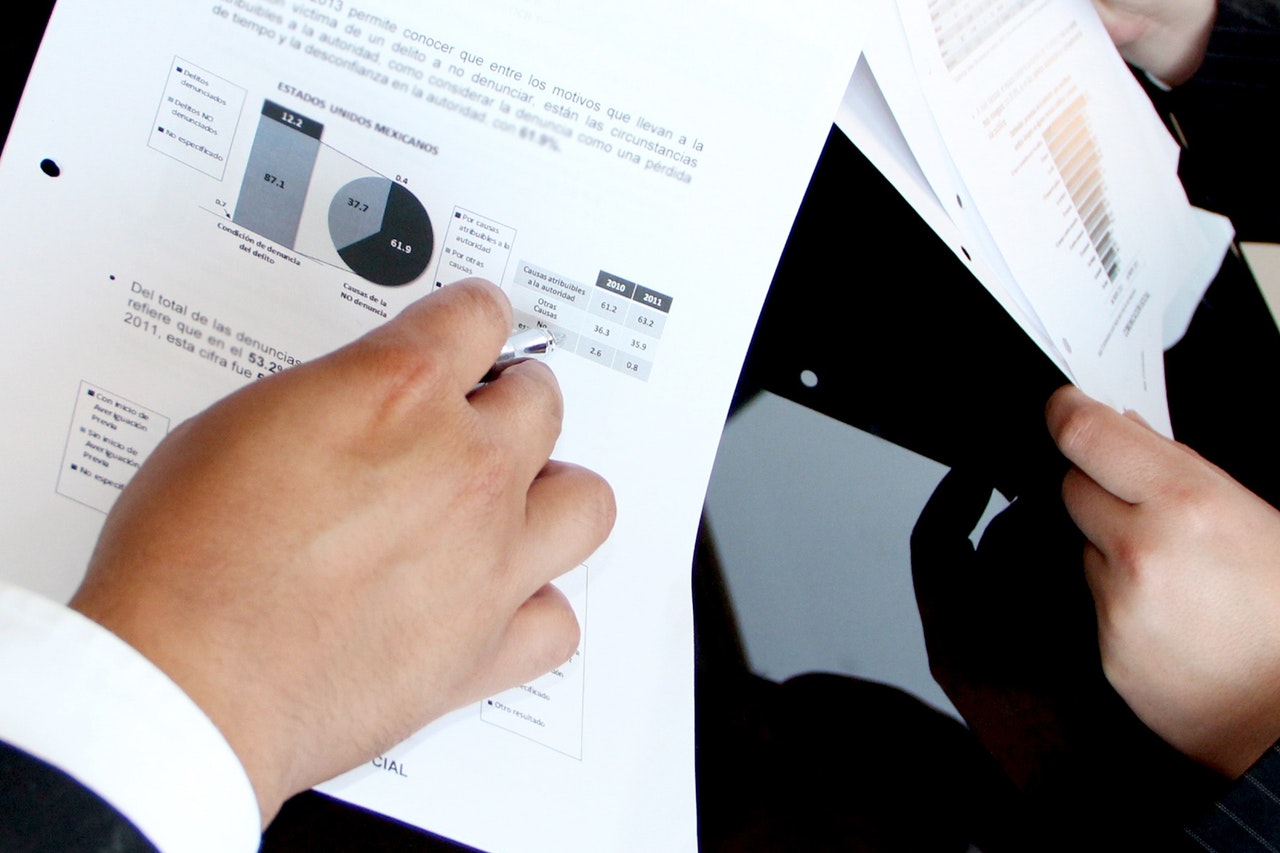As the name suggests, tax havens usually have low or even zero tax rates and are thus used for illicit activities such as tax evasion. The definition of tax haven sometimes also includes financial secrecy and confidentiality, political and economic stability as well as an ease of doing business for foreigners. By the Financial Action Task Force and the Organization for Economic Co-operation and Development’s (OECD) standards, the United States is deemed to have been compliant with all relevant measures in the fight against money laundering and terrorist funding and having adequately strict financial reporting standards. However, this is only representative of the country on average, thus it is possible that certain states have more lax rules and may be considered to be tax havens. This is because states might have different state laws or business policies that offer more generous tax exemptions or make it easier for investors to set up companies. Delaware in particular has been highlighted as a tax haven state since it offers fixed tax rates that would be significantly cheaper than other jurisdictions’ variable rate. Franchise tax for a limited liability company costs just $300 dollars, whilst corporations pay between $175 and $400. With such attractive tax policies, it is clear to see reasons why Delaware Is a tax haven despite not being on any official blacklists. Why is Delaware a tax haven? Tetra Consultants will help to answer this question and also assist you to register company in Delaware, showing you how to overcome these challenges to avoid the negative associations of your company with illicit financing activities.
Tax benefits
Delaware offers numerous tax benefits to incorporated firms, one of the reasons why Delaware Is a tax haven. Unlike other states, Delaware does not collect state level taxes such as sales tax, income taxes (for business owners non-resident in Delaware), property tax or value added taxes. This allows you to purchase goods and services within the state without incurring sales tax and provide them without incurring value added taxes. It also allows you to own property without incurring tax.
As mentioned earlier, Delaware’s taxes are calculated based on an annual flat rate that is standard for limited liability companies at $300. Corporations must pay between $175 and $400 depending on the type of type of corporation, share reporting method and the number of shares. The first implication of this flat fee is that it makes it considerably cheaper for firms, especially if they are generating more profit that would be taxed more heavily in other states that are using progressive taxation models instead. Secondly, it offers a high degree of certainty for businesses in both calculating and planning their tax obligations. This makes tax reporting easier and more accurate, making them less likely to encounter errors in reporting, and also better allows them to plan for further expansion with the taxes that would be incurred in mind. Thirdly, Delaware utilizes a pass-through taxation policy which prevents double taxation and reduces the tax burden on business owners. Lastly, Delaware does not charge tax on intangible assets. This allows you to have holdings of these income generating intangible assets in Delaware, and not incur any royalties on the generated income.
Financial secrecy and confidentiality
Assuming that you are forming a limited liability company, your business will be able to enjoy a high degree of financial secrecy and confidentiality that is usually associated with tax havens. Unlike other jurisdictions and company structures, you will not need to file annual reports or document board meetings and shareholder meetings. Added to this, businesses will not need to disclose who their managers and members are when filing state documents. This is because Delaware does not require the address and names of the members and managers of a limited liability company to be made public. Thus, the personal information and identities of beneficial owners will not be on public record, offering you financial secrecy and protecting your privacy.
Political and economic stability
Another important factor reasons why Delaware Is a tax haven is offering an adequate level of political and economic stability so that capital controls will not be imposed, preventing you from accessing your funds or assets. Political and economic stability also help to ensure that the value of your assets would not be adversely affected, and that you are able to manage them without interference.
The United States are one of the world’s most influential political systems and has close ties with many other global powers through associations such as the United Nations and North American Treaty Organization. This insulates it from external political unrest, though recent domestic tensions over racial issues have led to a drop in its Political Stability Index. This is an index released by the Global Economy that determines a country’s political stability based on other indexes from the Economist Intelligence Unit, World Economic Forum and Political Risk Services. Although they score 0.3 on a scale of -2.5 to 2.5, they are still above the global average of -0.06, making them relatively stable.
Since most of the world’s currencies are pegged to the US dollar, we can infer that the United States and thus by extension, has a high level of economic stability. It is the world’s largest economy by Gross Domestic Product at market exchange rates, and also sits on many influential international economic regulatory bodies such as the International Monetary Fund, World Bank and the World Trade Organization. This helps to reassure investors in Delaware of its economic stability.
Ease of doing business
With little to no restrictions on foreigners opening business, Delaware has a high degree of openness to foreigners, making it more likely for foreigner to want to deposit their funds and assets with Delaware. The company registration process can be completely online, and the fact that more than half of all the public corporations being set up in the USA were in Delaware really goes to show the ease and attraction of doing business in Delaware. In fact, the country has more corporate entities than people.
Delaware fulfills all four of our originally listed criteria to be a tax haven, and thus might be considered as one. While on an official level this might not be the case, unofficially, the associations with being a tax haven will definitely remain. Therefore, Tetra Consultants advises our international clients to be aware of how this would affect the credibility or reputation of their business in Delaware.
The process of Delaware company registration is hassle-free if you know how. With Tetra Consultants at the wheel, you will be able to dedicate your time and resources to other more important business channels.
With our lean-and-mean mentality, you can rely on our team of experts to provide you a seamless experience throughout the whole process of setting up a business in Delaware. Our ultimate goal is for your Delaware company to be operationally ready within the stipulated time frame of 5 weeks.
Our service package includes everything you will require to register business in Delaware:
- Company registration with Delaware Division of Corporations
- Local company secretary and registered address
- Registered agent
- Opening local or international corporate bank account
- Financial and business license applications
- Annual filling and tax services
Contact us to find out more about how to register company in Delaware. Our team of experts will revert within the next 24 hours.
FAQ
How does Delaware keep its taxes so low?- Delaware’s reputation for being a business-friendly state with low tax rates is due to several factors. First, the state has a pro-business regulatory and legal environment that attracts companies to incorporate there. Delaware is renowned for its expertise in corporate law, and its court system is well-equipped to handle complex corporate legal matters. This expertise has helped the state to attract a large number of companies to incorporate in Delaware, which in turn has helped to keep taxes low.
- Second, Delaware’s franchise tax system is another factor that contributes to its low taxes. All corporations incorporated in the state are required to pay a franchise tax, which is relatively low compared to other states. The franchise tax is based on the number of authorized shares a corporation has, meaning that larger companies pay a higher tax. This system generates revenue for the state while keeping taxes low for businesses.
- Finally, Delaware’s lack of a sales tax is another reason why businesses choose to incorporate in the state. Only a handful of states in the US do not have a sales tax, and this can be a significant incentive for businesses, particularly those in the retail sector. The absence of a sales tax helps to keep costs down for businesses, which in turn can keep prices lower for consumers. Overall, Delaware’s business-friendly policies and low taxes make it an attractive location for businesses to incorporate.
Why is Delaware a tax friendly state?
- Delaware’s tax-friendly reputation stems from its low corporate income tax rate, unique franchise tax system, lack of state-level sales tax, and business-friendly laws. Unlike many other states in the US, Delaware imposes a flat corporate income tax rate of 8.7% on all businesses operating in the state, which is one of the lowest in the country. Additionally, Delaware’s franchise tax system is calculated based on the number of authorized shares a corporation has, rather than the number of shares it actually issues, which results in relatively low franchise tax compared to other states.
- Moreover, Delaware’s lack of state-level sales tax is another factor that contributes to its tax-friendliness. This can be a significant incentive for businesses, especially those in the retail sector, as it helps keep costs down for businesses and can keep prices lower for consumers. Furthermore, Delaware is known for its business-friendly legal and regulatory environment, which has helped the state become a premier forum for resolving corporate legal disputes. Its corporate law system is well-developed, and the Delaware Court of Chancery is widely regarded as one of the best forums for resolving complex corporate legal disputes. Overall, Delaware’s combination of low taxes, unique franchise tax system, lack of sales tax, and business-friendly laws make it an attractive location for businesses looking to incorporate.
Does Delaware not pay taxes?
- Delaware residents are required to pay federal income taxes and state income taxes, indicating that Delaware is not a tax-free state. However, Delaware has no sales tax, and its corporate income tax rates are relatively low, making it an attractive option for businesses. Delaware is often referred to as a tax-friendly state due to its favorable tax environment. The state offers tax incentives and credits to businesses that invest in certain areas or generate jobs within the state.
- While Delaware residents must pay state income tax, the rates are generally lower compared to other states. However, tax laws can be complex and vary depending on individual circumstances. Therefore, individuals and businesses are encouraged to seek professional tax advice to ensure they are in compliance with all applicable laws and regulations. Although Delaware is known for being a tax-friendly state, it is not a tax haven where individuals or businesses can evade taxes.
What type of tax does Delaware not have?
- Delaware is a state in the USA that does not charge its residents sales tax. Unlike other states where customers are required to pay additional sales tax on purchases, in Delaware, consumers can buy goods without worrying about the extra tax. It is important to note, though, that Delaware may still impose other types of taxes like property tax and income tax, which will be applicable to individuals and businesses operating within the state. So while Delaware may not have a sales tax, other taxes may still apply.



































































































































































































































































































































































































































































2 comments
jan van der Wal
January 5, 2023 at 7:37 pm
Good morning
I am looking to open a holding company that can export.
We are buying aluminum profiles in Turkey and CHIna and export them to St Maarten and surrounding islands but the profit tax in st maarten is high?
Do you have a good option?
Tetra Consultants
January 9, 2023 at 11:22 am
Thank you for reaching out. One of our consultants has contacted you to discuss the above.